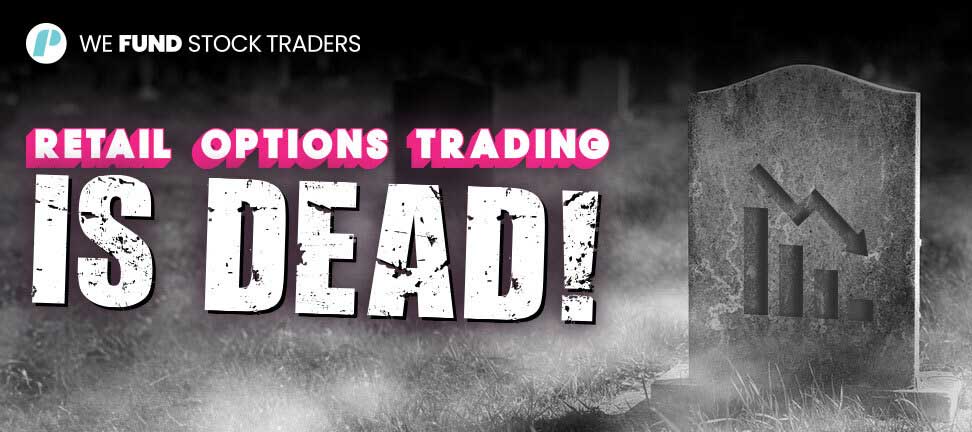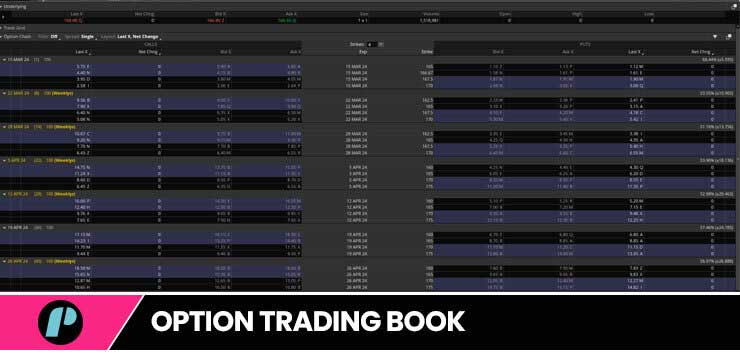
Introduction
Until very recently, Options Trading used to be a popular choice for retail traders hoping to make the most out of their money in the financial markets and this is not surprising.
With prices way lower than the underlying assets, higher leverage, and premium payments, Options trading offers the potential of making a much bigger profit than just trading stock.
Why is it, then – it comes naturally to ask – that retail options trading is decreasing in popularity so fast? And, if it is dying, what’s killing it?
In today’s article, we’ll have a go at answering those questions by discussing what Options are and how Options Trading works and explaining why options trading is no longer the best option for trading.
What Are Options?
An Option is a contract that gives the buyer the right, but not the obligation, to buy or sell an underlying asset at a specific price on or before a certain date. The seller of the option, in turn, assumes the obligation to buy or sell the asset if the buyer decides to exercise the option. On paper, Options Contracts are a complex but fascinating instrument, offering traders the potential for large profits in both rising and falling markets. In reality, things are a little different.
The idea of creating the first forms of options contracts came from the will to help farmers protect their livelihood against potential declines in the price of their product while, at the same time, protecting buyers from sudden price increases. In other words, one might say, Options Contracts were born as a simple form of insurance.
However, In more modern times (since 1973, to be exact,), Options have become a financial instrument of their own, representing a significant portion of institutions’ financial transactions and gaining one of the top spots as contributors to market efficiency.
Traders and institutions began to buy, sell, and exchange Options Contracts as a way of protecting their portfolios against market volatility or edging a large position and exposure in an asset.
As it often happens, it didn’t take long for the sharpest-minded traders and institutions of the time to realize that, by trading Option Contracts, they could profit on the leveraged price volatility of the contracts even without any intention of ever buying or selling the underlying asset. Simply put, individual traders and institutions begin to speculate on the change in the value of the contracts rather than the underlying asset.
To understand how Options Trading turned out to become an incredible money-maker for large traders and institutions over the years and, at the same time, such a horrific bank-breaker for retail traders, we need first to understand how Option trading works.
Let’s take a look.
Key Notes:
- Call Options: bought with the expectation of rising prices.
- Put Options: bought with the expectation of falling prices.
- Strike Price: the price the underlying asset can be bought/sold.
- Expiration Date: the day by which the underlying asset can be bought/sold
How does Options Trading work?
As we mentioned, traders can profit from options trading with a focus on the basics. Traders can make money in options trading mainly through two strategies: edging and speculation.
Unsurprisingly, while smart money has generally excelled and enjoyed unbelievable profits from both strategies, most retail traders fall victim to the allure of high leverage and potential for larger gains for failing to consider and manage the high risk attached.
There are two types of Options: Calls and Puts.
Call Options
Suppose a trader believes the price of a stock is going up. They might buy a call option, which lets them purchase the stock at today’s or a specific price (strike price) on or before a certain day (expiration date), even if the price goes up in the future.
If the stock price does go up, they can buy the stock at the lower price they locked in, sell it at the higher current market price, and pocket the difference as profit (after subtracting the cost they paid for the option).
Put Options
If the trader believes a stock’s price will go down, they might buy a put option. This gives them the right to sell the stock at today’s price, even if its market price falls. If the price does fall, they can buy the stock at the lower price, sell it at the higher price guaranteed by the option, and make a profit (again, after deducting the option’s cost).
It all sounds quite nice and simple… until you add the high risk involved, that is.
One of the main reasons why options trading wreaked havoc among so many retail traders as opposed to (most) institutions is the complex nature of options contracts.
Retail traders with limited resources and small trading accounts are often more prone to accept a higher risk to leverage their dollars hoping for larger gains.
Options contracts typically require a fraction of the capital needed to trade the underlying asset which means that small traders can amplify their gains. However, a high degree of leverage means that a small movement in the underlying asset can result in a large gain as well as a large loss in the option price. This leverage, of course, amplifies both profits and losses, making option trading a high-risk endeavor, especially for smaller traders investing their own money.
Additionally, options have an expiration date, which adds a layer of complexity and risk to trading them. As if predicting the future direction of price wasn’t challenging enough, retail traders trading Option would often struggle to accurately predict the direction of the underlying asset within a specific time frame which, more often than not, led to Option expiring worthless and catastrophic losses.
Furthermore, as if this wasn’t enough, contrary to smart money, less experienced retail traders often fail to realize that, unlike trading stock or ETFs, Option prices are influenced by a variety of factors such as time decay, implied volatility and even interest rate.
Many retail traders find it difficult to accurately predict these variables and adjust their strategy accordingly and in time.
Key Notes:
The three main risks in Options Trading:
- Leverage: Leverage amplifies profits as well as losses.
- Expiration Date: Traders need to predict price volatility within a certain period
- Contract price: the price of the underlying asset is not the only factor that influences the contract price.
Prop Trading Killed Options
Despite the generally dire results, till not long ago, there weren’t many other ways available for small traders to leverage their trading money and gain worthy returns other than trading Options until Prop Trading Firms became available.
It wasn’t the high risk that persuaded retail traders to stop trading Options and it wasn’t the hundreds of millions of dollars lost from traders’ home offices around the world; it was the simple fact that Prop Trading Firms – like Trade The Pool – started to offer traders a much better option than Options.
As a Prop Trading Firm, Trade the Pool offers a more structured approach to trading. Proprietary trading firms provide retail traders with access to training and educational material, charting, analysis and risk management tools, and – most importantly – capital to trade with.
This can help retail traders develop the skills and discipline needed to succeed in the markets without the need to compensate for the lack of capital with extremely high-risk positions.
PTT also has strict risk management guidelines and rules in place to help protect traders from excessive losses. Traders trading with prop firms will have defined risk parameters and daily loss limits, helping to mitigate the potential for catastrophic losses so common in Options Trading.
In Conclusion
Overall, while option trading can be a profitable venture for experienced and institutional traders, it has also been demonstrated to be excessively risky for retail traders, especially those who are new to trading.
Prop Trading Firms such as Trade The Pool, offer a potentially safer and more structured way for retail traders to gain exposure to the markets, providing the resources and support needed to succeed.
By trading with Trade The Pool, traders can benefit from access to capital, training, and risk management tools that can help them navigate the complexities of the financial markets and increase their chances of success.
So, Options or Prop?
It’s a no-brainer, really.
Hope this helps.
If you liked this post make sure to share it!







